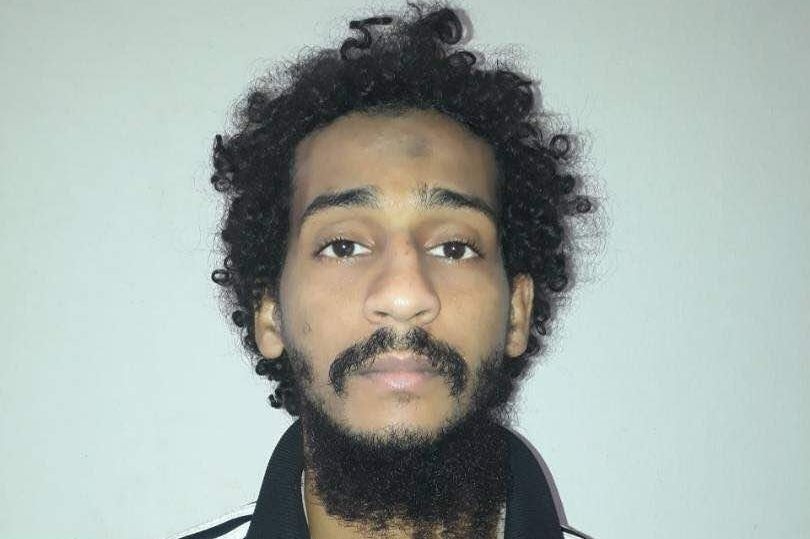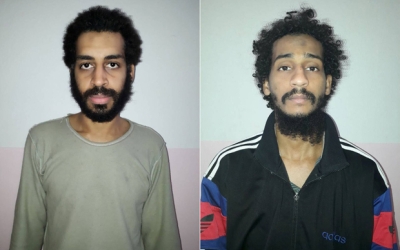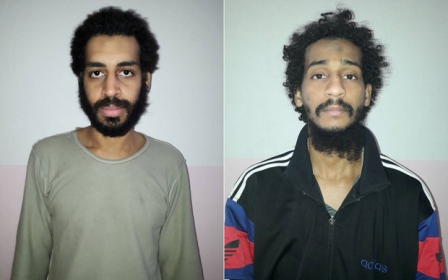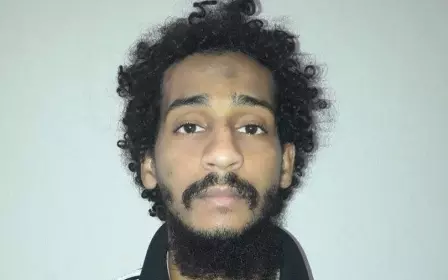UK data-sharing with US over IS suspect was unlawful, Supreme Court rules

The British government acted unlawfully by providing evidence to US investigators in the case of a suspected member of an Islamic State (IS) group execution cell without seeking assurances that he would not be subjected to the death penalty, the Supreme Court has ruled.
In a judgment on Wednesday, the court's seven judges ruled unanimously that the transfer of material in the case of El Shafee Elsheikh was unlawful because it breached data protection laws.
Elsheikh is accused of being a member of a British IS cell responsible for the executions of western hostages in the period when the militant group controlled large areas of Syria and Iraq. He is currently in US custody along with another suspected member of the cell, Alexanda Kotey.
A legal challenge against the government was launched by Elsheikh's mother, Maha El Gizouli, in 2018 after it was revealed that then-British Home Secretary Sajid Javid had told US Attorney General Jeff Sessions that there were “no strong reasons for not requiring a death penalty assurance” in the cases of the two men.
While US officials appear to have wanted Elsheikh and Kotey to face justice in the UK, Javid said that prosecutors had concluded that there was "insufficient evidence" to put them on trial in the UK.
New MEE newsletter: Jerusalem Dispatch
Sign up to get the latest insights and analysis on Israel-Palestine, alongside Turkey Unpacked and other MEE newsletters
Lawyers for El Gizouli argued that the letter was at odds with the UK's longstanding policy of opposition to the death penalty.
Previous home secretaries had sought assurances in relation to the death penalty in response to requests from US officials regarding evidence-sharing, known as Mutual Legal Assistance (MLA), in relation to their investigation into the men's activities, but no such assurances were forthcoming.
The British government subsequently suspended cooperation with US authorities as a consequence of the legal challenge. El Gizouli took the case to the Supreme Court, the UK's highest court, after the High Court ruled in the government's favour in January 2019.
In Wednesday's judgment, the court ruled that it was unlawful to transfer personal data to law enforcement authorities abroad for use in capital crime proceedings.
They agreed that Javid had not given due consideration to the 2018 Data Protection Act, which implemented in British law a European Union law enforcement directive requiring safeguards to be sought that "personal data will not be used to request, hand down or execute a death penalty or any form of cruel and inhuman treatment".
US urged UK to 'set an example'
Elsheikh and Kotey, who are both from London, are accused of being members of an IS cell led by Mohammed Emwazi, who was identified as the masked figure in a series of execution videos released by the group in 2014 and 2015. The group were widely referred to as “the Beatles” in the media because of their British accents.
Emwazi was killed in a US drone strike in 2015. A fourth alleged member of the cell, Aine Davis, was arrested in Turkey in 2015 and was convicted and jailed on terrorism charges in 2017.
Both Elsheikh and Kotey, who were captured by Syrian Kurdish forces in 2018 and subsequently transferred into US custody in Iraq, are among dozens of British nationals in Syria who have been stripped of their citizenship.
Giving evidence to the court, Graeme Biggar, the Director of National Security in the Home Office, said that British and US officials had met in March 2018 to discuss what should happen to the pair.
He told the court that the men's capture had "brought immediate political reality and urgency to the question of where he could and should be brought to justice".
It had been the "clear view" of British officials, Biggar said, that "a prosecution of Mr El Sheikh in the US federal court system, which included the UK evidence, represented the only realistic prospect of securing justice for the victims and their relatives".
According to Biggar, however, senior US officials had continued to resist foreign fighters being tried in the US, and had considered that the UK "ought to set an example to the wider international community" by putting its own nationals on trial.
In a statement, Birnberg Peirce, El Gizouli's lawyers, said: "Ms El Gizouli thanks the court for its careful consideration of her appeal and recognises the difficult issues it raises. She has always expressed her belief that her son, if accused, should face justice; and that any trial should take place in the UK."
El Gizouli had asked the Crown Prosecution Service to conduct a review of the claim that there was insufficient evidence for him to be charged and tried in the UK, Birnberg Peirce said.
A Home Office spokesperson said: “The Government’s priority has always been to maintain national security and to deliver justice for the victims and their families. This has not changed.
“We are clearly very disappointed with today’s judgment and are carefully considering next steps.”
A Crown Prosecution Service said the police investigation is ongoing.
“Once the investigation has concluded and any additional material has been provided to the CPS, our specialist prosecutors will review all the evidence in line with our legal test.”
Middle East Eye delivers independent and unrivalled coverage and analysis of the Middle East, North Africa and beyond. To learn more about republishing this content and the associated fees, please fill out this form. More about MEE can be found here.




